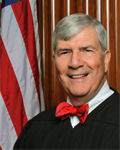Edward Thomas Brady
| Edward Thomas Brady | |
|---|---|
| North Carolina Supreme Court Justice | |
| Assumed office 2002 | |
| Private practice attorney | |
| In office 1978-2003 |
Edward Thomas Brady was an Associate Justice on the North Carolina Supreme Court. He was elected in 2002 in a nonpartisan election to an eight-year term that expired in 2010. He did not run for re-election in 2010.
Education
Brady received his B.A. degree in criminal justice from the University of Nebraska at Omaha in 1972 and earned a Masters degree in criminal justice from John Jay College of Criminal Justice, City University of New York in 1977. He completed his J.D. degree from California Western School of Law in 1978.[1]
Career
Upon graduating law school in 1978, Justice Brady began in private practice in Fayetteville, North Carolina with Brady and Brady. He continued with the private firm until 2003, when in 2002, he was elected to serve as an associate justice for the North Carolina Supreme Court.[1]
Awards and associations
Brady is a member of the American Bar Association, the North Carolina Bar Association, the Georgia Bar Association, the District of Columbia Bar Association, Judicial Division, Appellate Judges’ Conference, and a representative from the Division to the Standing Committee on Minorities in the Judiciary. He is additionally admitted to practice in the United States Supreme Court, the United States Court of Appeals for the 4th Circuit, the United States Court of Appeals for the District of Columbia, the United States Army Court of Military Review, and the United States Court of Military Appeals.[1]
Approach to the law
"Justice Brady’s judicial philosophy is, first of all, to uphold his oath of office and 'support, maintain, and defend the Constitution.' Justice Brady has a strong commitment to the rule of law, which means that no one person is above the law, and judges are no exception. He believes that the judiciary of North Carolina must remain independent and a separate co-ordinate branch of the government of the State of North Carolina, free from undue interference. Justice Brady understands the role of judges is to interpret the law and Constitution as written rather than rewrite the law based upon a judge’s own policy preferences and thereby thwart the express will of the people."[1]
External links
- The North Carolina Court System, Edward Thomas Brady
- Project Vote Smart, Associate Justice Edward Thomas Brady (NC)
Footnotes




